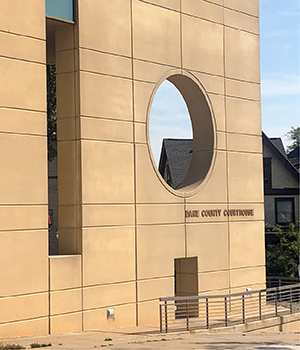
When Parent Education is ordered, both parents must attend. If litigants have previously attended Parent Education, the requirement may be waived by Family Court Services (FCS), the judge, or the court commissioner. Parent Education may be completed at another agency if approved in advance by the Family Court Services Director. Parent Education must be completed within 45 days of the Court’s referral.

Mediation of legal custody or physical placement issues may be ordered by a judge or a commissioner based on a motion, petition, letter, or an oral request at a hearing. Mediation is a confidential, cooperative process conducted between the parties in disagreement with the assistance of an FCS counselor. Attorneys do not participate in the mediation session. Financial issues are not discussed during mediation at FCS. A waiver of mediation pursuant to statutory criteria may be requested from the referring judge or commissioner. The judge or commissioner may waive mediation upon finding that attending mediation will cause undue hardship or endanger a party’s health or safety.
There is no cost for the initial mediation session, but the parties will be required to pay a fee (set by Dane County ordinance) for repeat or extended mediation sessions. Parties may also arrange for private mediation from a third party provider, as permitted by statute. Mediation must be completed within 45 days (60 days in families with domestic violence that has been identified by the court) from the date assigned to a counselor.
Commissioners will evaluate post-judgment verified petitions or motions with supporting affidavits and make the determination as to whether a substantial change in circumstances is set forth in the submission. If they determine it does not, they will dismiss the petition or motion. Parties may file for a de novo hearing with the assigned judge. If the verified petition or motion is not dismissed, the matter will be referred for mediation with FCS or set for a status conference in an attempt to resolve the issue(s) or define the contested issue(s). At a status conference, a determination may be made as to whether a Guardian ad Litem (GAL) is required or whether mediation is appropriate. The matter may be scheduled for a contested hearing or for some other appropriate action. Mediation referrals are docketed by the commissioner center staff.
Judges who are directly contacted by the parties and choose not to route the motion through the commissioner center may evaluate post-judgment verified petitions or motions with supporting affidavits and make the determination as to whether a substantial change in circumstances is set forth in the submission. When they determine it does not, they will dismiss the petition or motion. If the verified petition or motion is not dismissed, the matter will be referred for mediation with FCS or set for a status conference. The referral to FCS is docketed by the branch staff.
When mediation is assigned to a counselor, FCS staff will email notice to the branch clerk. The clerk may schedule a file review. A mediation-to-study referral will not be made automatically. A study will only be ordered if mediation has failed or has been waived.
If the parties reach an agreement or a partial agreement in mediation, the counselor shall circulate the agreement to the parties, their attorneys, and the GAL, if any, for review. Any reviewing attorney shall certify on the mediation agreement that he or she reviewed it. The GAL, if any, shall comment on the agreement based on the best interest of the child. If no objections or modifications are received within 30 days, the counselor shall certify the written agreement accurately reflects the agreement of the parties and will forward the agreement to the assigned judge. The court may enter an order incorporating the terms of the agreement as a final order of the matters set forth in the mediation agreement. In pending, pre-judgment divorce cases and initial paternity cases, the judge shall schedule a hearing regarding the agreement prior to adopting it as a final order.
If a partial agreement is reached, a memo will be sent to the referring commissioner indicating a partial agreement was forwarded to the Court but some issues still need resolution.
If mediation is unsuccessful, the counselor will notify the referring court official and all parties, indicating no further action will be taken unless directed by the court. FCS will also advise if a failed mediation was the result of one or both parties’ lack of participation. The judge or commissioner will schedule a status conference to attempt to resolve the matter or narrow the disputed issues and enter other appropriate orders. If the failed mediation is returned to the commissioner and is not resolved at the status conference, a memorandum articulating resolved issues and those still outstanding will be sent to the judge.

When the study is assigned, the initial appointment letters will note the date FCS recommendations are due. Counselors will include in their recommendations the dates of the ordered referral and case assignment. Studies are to be completed within 120 days, unless the counselor receives an extension.
The following matters will not be referred for a study: guardianship disputes, contempt and enforcement issues, monitoring of Court Orders, disputes regarding transportation or time and place of transitions, minimal changes to the schedules, vacation and holiday schedules, disputes regarding choice of schools or extracurricular activities, cases in which the parents continue to reside in the same residence, cases in which the parties have jointly retained a private practitioner to conduct a study concerning the pending motion or petition, and cases in which both parents live outside of Dane County.
Recommendations to the Court will be in letter format using statutory criteria as a guideline and should explain the reasons for the recommendation. The counselor will not be expected to prepare any further report.
Inquiries and comments between counselors and judges/commissioners about the merits of a case shall be in writing with copies to all parties. Parties, attorneys, the Guardians ad Litem and FCS counselors may communicate with each other for the purpose of exchanging information and explaining their respective positions regarding the issues involved in the case. All written materials sent by parties and attorneys must be copied by the sender to all other parties and attorneys, with the exception of the Family Study Questionnaire and other initial paperwork sent out by the FCS office. Other substantive information received by the counselor will be available for review in the file. Communication between counselors and outside evaluators should be in writing with copies provided to all parties or orally with all the parties and counsel.
If during the course of the study process, the parties reach an agreement on the outstanding issues, the counselor will prepare a document reflecting that agreement. The document will be forwarded to the court for review and further order. No waiting period or certification form is required.
Brief Focused Assessments (BFA) offer an alternative to comprehensive child custody and physical placement evaluations. BFAs assist the court’s decision-making by providing answers to well defined, specific questions, identified by the court. The BFA concludes with a report to the court, parents, and the attorneys of record. The report will summarize the focus of the assessment and will outline the procedures and information gathered in the process. A summary analysis of the information may include opinions and/or recommendations related to the issue specified in the BFA. The BFA should be completed 60 days from the day of assignment, unless there is domestic violence or the court extends the time. If a BFA referral is unclear, the FCS Director may request clarification from the assigned judge. These requests will be copied to all parties. If during the course of a BFA the counselor identifies significant concerns outside of the referral, they will promptly inform the judge, who may choose to modify the referral.
Safe at Home participants may be asked to share their physical address if deemed necessary by the assigned counselor. This information will be kept strictly confidential and will not be shared with the other parent at any time.
Mediation in relocation cases will be held immediately following the initial relocation hearing at the court commissioner’s center. If an agreement is reached, it will be reduced to an order by the commissioner. If no agreement is reached, the court may order a relocation study, with a report due to the Court in 50 days. A hearing will be scheduled within 60 days.
After failure to appear at Parent Education, a mediation or a study appointment, FCS shall send notice of a second appointment. This notice will advise the party (parties) that failure to appear on the new date could result in either the motion being dismissed or granted, depending on which party failed to appear, petitioner or respondent. Notification will be sent to the referring Court official when a second appointment is missed.
Failure of the non-moving party to attend Parent Education or mediation or to comply with the directives of FCS or the Court during the course of the study will not delay the initiation or completion of a study by FCS. Failure to comply may result in additional costs, fees, or other sanctions as ordered by the Court.
A party and/or attorney of record may request access to the Family Court Services file regarding their case after the recommendations are completed. That request should be made to the counselor assigned, who will prepare the file. Administrative staff will then schedule the review with the requestor. Each person reviewing the FCS file must sign a FCS Non-Dissemination Agreement (NDA), prohibiting further distribution of viewed or copied material from the file. Violation of this agreement is punishable by contempt or other sanctions imposed by the court.
If the file needs to be reviewed during the time the study is being conducted, the request should be made to the assigned judge. The file will not be available five business days before trial.
Portions of the case file are automatically sequestered. Sequestered information includes financial information, Department of Human Services records, medical, mental health, and AODA records. Documents that have been sequestered will be held in separate paper files or identified in electronic files. With an order signed by the assigned judge, sequestered documents may be viewed but not copied. Requests to seal documents so they cannot be viewed may be directed to the assigned judge. If so ordered, those documents will not be shared for file review.
FCS will charge a reasonable fee, set by Dane County ordinance, for copying non-sequestered records. FCS will ordinarily process requests for copies within 3 to 4 business days.
After the case is closed, an order must be issued by the assigned Judge to access the FCS file.
No further distribution of viewed or copied material is permitted.
The responsibility for fees shall be set by FCS according to the fee schedule established by Dane County ordinance. Parties must pay fees or obtain a fee waiver within the time period set by FCS. Any party may seek a fee review by requesting a Judicial Review Form available from the FCS office, the commissioner center or on the FCS website. That form and the outlined accompanying documentation should be sent directly to the commissioner center within 15 days of being notified of responsibility for payment. Unpaid fees may be referred to a collections agency.
No media of any kind may be used to record, capture, copy, or photograph any in-person, telephonic, or electronic meeting, mediation, BFA or study session, nor any person or document. All electronic media (cell phones, iPhones, etc.) equipment must be turned off during FCS appointments and/or calls.
Revised: 12/08/2023